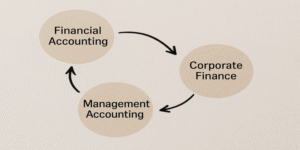The accounting function is a central component of any organisation, responsible for maintaining accurate financial records, ensuring compliance with regulatory frameworks, and providing management with reliable data for decision-making. Accounting is not a singular activity but a diverse discipline encompassing multiple branches, a wide array of career opportunities, and requiring a range of skills and competencies. This paper explores these elements, demonstrating the indispensable role of accounting function in organisational success.
1.0 Branches of Accounting
Accounting consists of specialised branches that address different organisational needs.
1.1 Financial Accounting
Financial accounting centres on preparing statutory financial statements, including the balance sheet, income statement, and cash flow statement. These reports are primarily for external stakeholders such as investors, creditors, and regulators, offering a transparent view of organisational performance. Adherence to International Financial Reporting Standards (IFRS) or Generally Accepted Accounting Principles (GAAP) ensures comparability and reliability (Atrill & McLaney, 2021). For example, a listed UK company must comply with IFRS to present financial results transparently to shareholders.
1.2 Management Accounting
Management accounting focuses on internal decision-making. Management accountants assist in budgeting, forecasting, and cost analysis to support efficiency and strategic planning (Drury, 2020). For instance, a retail chain may rely on variance analysis to identify why projected sales differ from actual results, enabling corrective action.
1.3 Auditing
Auditing ensures the fairness and reliability of financial reports. External auditors provide independent assurance to shareholders, while internal auditors evaluate governance, risk management, and control systems (Porter & Simon, 2017). For example, external audits of banks are critical for maintaining public confidence and stability in the financial system.
1.4 Tax Accounting
Tax accounting manages compliance with tax laws and supports tax planning to minimise liabilities within legal frameworks (Lymer & Oats, 2018). Businesses use tax accountants to navigate complex systems such as corporation tax or VAT, ensuring compliance while adopting effective tax strategies.
1.5 Forensic Accounting
Forensic accounting merges financial expertise with investigative techniques to uncover fraud and support litigation (Ramaswamy, 2005). High-profile cases such as the Enron scandal demonstrate the critical role of forensic accountants in detecting corporate misconduct.
2.0 Career Opportunities in Accounting
The accounting profession offers numerous career paths, from entry-level clerical positions to strategic leadership roles.
2.1 Accounts Clerk and Assistant
Entry-level roles such as accounts clerks focus on transaction processing, bank reconciliation, and basic financial reporting (ACCA, 2023). These provide foundational experience for progressing in the profession.
2.2 Qualified Accountant
A qualified accountant, such as a Chartered Accountant (CA) or Chartered Management Accountant (CIMA), undertakes advanced responsibilities like preparing statutory reports, conducting audits, and providing strategic financial advice (AAT, 2023). These roles span public practice, industry, and government sectors, offering broad career versatility.
3.0 Roles in Commercial Finance and Global Business Services
Modern organisations demand specialised finance roles beyond traditional accounting.
- Cost Analysts focus on analysing production costs to identify savings opportunities (Weygandt et al., 2018). For instance, in a manufacturing firm, cost analysts may pinpoint inefficiencies in raw material procurement.
- Business Controllers act as financial strategists, driving performance improvement by linking financial data to decision-making (Kaplan & Atkinson, 2015).
- Pricing Professionals blend accounting and marketing knowledge to set competitive yet profitable product prices (Horngren et al., 2015).
- Purchase-to-Pay (P2P) Specialists ensure timely supplier payments and compliance in procurement cycles (CIMA, 2022).
- Report-to-Report (R2R) Professionals produce financial and management reports that ensure compliance and accuracy (IFAC, 2021).
4.0 Skills Required in Accounting
Accountancy requires both technical expertise and soft skills.
- Numerical skills underpin financial analysis and reporting accuracy (Atrill & McLaney, 2021).
- Problem-solving enables accountants to resolve discrepancies and optimise efficiency (Kaplan & Atkinson, 2015).
- Integrity ensures trust, as accountants manage sensitive financial data (IFAC, 2021).
- Negotiation and customer service skills are particularly relevant in roles such as P2P, where collaboration with suppliers is essential (CIMA, 2022).
For example, a management accountant may combine numerical and problem-solving skills when evaluating whether to outsource production, weighing cost savings against risks.
5.0 Key Competencies in Practice
Accountants also perform daily operational tasks vital to financial control, such as:
- Managing sales and purchase ledgers, ensuring accurate revenue and expense recording.
- Supplier reconciliations, confirming account balances.
- Inputting sales invoices, guaranteeing accurate cash flow tracking.
- Maintaining up-to-date records, crucial for compliance and informed decisions (Weygandt et al., 2018).
The accounting function is foundational to organisational stability and growth. From ensuring regulatory compliance to driving strategic decisions, accountants contribute across multiple dimensions. The diverse branches of accounting, coupled with varied career opportunities, reflect its wide scope. Success in this profession requires strong numerical ability, analytical thinking, and a commitment to ethical standards. As businesses face increasingly complex financial landscapes, the accounting function remains a critical pillar for both operational efficiency and long-term sustainability.
References
ACCA (2023) Accountancy Careers. [Online]. Available at: https://www.accaglobal.com [Accessed 17 September 2024].
AAT (2023) Professional Accountant Qualifications. [Online]. Available at: https://www.aat.org.uk [Accessed 17 September 2024].
Atrill, P. and McLaney, E. (2021) Accounting and Finance for Non-Specialists. 11th ed. Pearson.
CIMA (2022) Global Business Services: P2P and R2R Professionals. [Online]. Available at: https://www.cimaglobal.com [Accessed 17 September 2024].
Drury, C. (2020) Management and Cost Accounting. 10th ed. Cengage Learning.
Horngren, C., Datar, S. and Rajan, M. (2015) Cost Accounting: A Managerial Emphasis. 15th ed. Pearson.
IFAC (2021) International Financial Reporting Standards. [Online]. Available at: https://www.ifac.org [Accessed 17 September 2024].
Kaplan, R. and Atkinson, A. (2015) Advanced Management Accounting. 4th ed. Pearson.
Lymer, A. and Oats, L. (2018) Taxation: Policy and Practice. 26th ed. Fiscal Publications.
Porter, B. and Simon, J. (2017) Principles of External Auditing. 4th ed. Wiley.
Ramaswamy, V. (2005) Forensic Accounting. Wiley.
Weygandt, J., Kimmel, P. and Kieso, D. (2018) Financial Accounting. 11th ed. Wiley.









